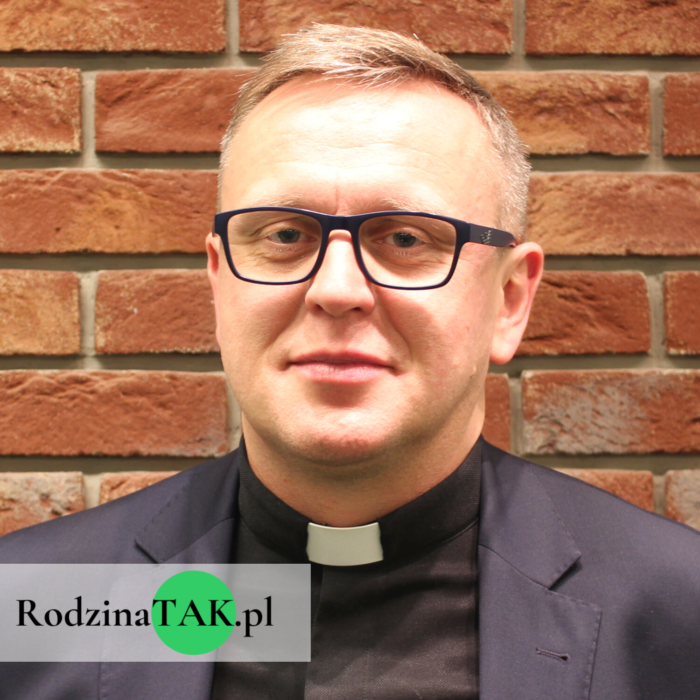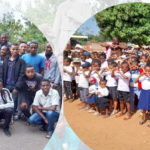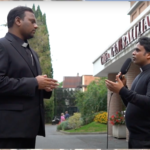In Krakow at Saska street is home to not only the Sacred Heart monastery and hotel, but also also the seat of specialized pastoral ministries, where, among others, is very important to promote a medical and pastoral care for married couples who cannot have children (naprotechnology). An Interview with Father Włodzimierz Płatek scj
 Father Włodzimierz is a Priest of the Sacred Heart. A graduate of The Pontifical University of John Paul II in Krakow. He graduated in moral theology from the Catholic University of Lublin. Theologian, moralist, bioethicist. Lecturer at the Major Missionary Seminary of the Fathers of the Sacred Heart in Stadniki. He worked as a vicar and for several years served as deputy director of the John Paul II Foundation House in Lublin, which belongs to the Vatican John Paul II Foundation. Currently, he is the director of Domus Mater in Krakow and the pastor of RodzinTak.pl, where he runs: Community of Married Couples, catechesis for engaged couples, conversations with fiancées, spouses and parents, Spiritual Adoption and marriage retreats, and is also a confessor and spiritual father of fiancées and spouses.
Father Włodzimierz is a Priest of the Sacred Heart. A graduate of The Pontifical University of John Paul II in Krakow. He graduated in moral theology from the Catholic University of Lublin. Theologian, moralist, bioethicist. Lecturer at the Major Missionary Seminary of the Fathers of the Sacred Heart in Stadniki. He worked as a vicar and for several years served as deputy director of the John Paul II Foundation House in Lublin, which belongs to the Vatican John Paul II Foundation. Currently, he is the director of Domus Mater in Krakow and the pastor of RodzinTak.pl, where he runs: Community of Married Couples, catechesis for engaged couples, conversations with fiancées, spouses and parents, Spiritual Adoption and marriage retreats, and is also a confessor and spiritual father of fiancées and spouses.
Dorota Mazur: The pain associated with the awareness of the inability to be a mother/father is great, but finding the cause – which will reduce the pain, although not numb it completely – is concrete help in gaining inner peace of mind that you have done everything that was humanly possible. At this stage, the presence of the priest is significant. What – apart from spiritual/priestly accompaniment and words of support – can a priest do for suffering spouses?
Fr. Dr. Włodzimierz Płatek SCJ: I think the most important thing is to give spouses a sense of presence – I am with you. This is the first and most important issue in the lack we experience – specifically the lack of a child. Especially a long-awaited child – especially when it is preceded by so-called habitual miscarriages, i.e. the loss of a child at an early stage of its prenatal life. This pain affects both spouses. For an obvious reason, the woman suffered more, because her entire body and mind were directed towards the pregnancy and having a child. Suddenly this process is interrupted, either by another failed attempt at conception or by premature death. I must admit that this is very difficult to explain and accept. It is good to suggest good solutions in such experiences, which the couple should think about and decide for themselves what to do next. Contacts with the best specialists in various areas of health and life are important.
DM: The situations mentioned by you above differ in the intensity of pain – the depth of experience?
WP: A lighter trauma, if you can make a gradation of the pain, disappointment and grief, is expecting conception and not achieving the expected result. This sense of waiting and uncertainty is a suffering that is often difficult to understand by the entire outside world, even by those closest to us. Various solutions are then proposed, including suggestions regarding in vitro. I know from experience that this state of affairs is additional suffering for the couple, because they often do not expect such support. A much more difficult situation is the awareness of being a parent – the child is at the prenatal stage – in the mother’s womb and suddenly ceases to exist. The consequences caused by this state of affairs are a real trauma after death, which is the loss of an unborn child. What I can do as a priest is to give spouses the feeling that I am with them, assure them of my closeness, God’s closeness and of prayer for them. To walk this path properly, spouses must experience a time of mourning. As much as they are able, it is good to include their relatives and friends in this experience.
DM: That’s what I wanted to ask, how about engaging your environment in your experience and not burdening your own problems on the other? That’s quite a big difference, right?
WP: Introducing family and friends – people close to us – is a valuable experience that allows us not to be alone in suffering. It is worth making our loved ones aware that we are trying for a child, that we are affected by pain and that we talk about this pain – without burdening anyone. There cannot be such a situation, although it often happens that after the loss of a child, women develop a feeling of grief, jealousy and even aggression, which may turn into hatred towards mothers/women who are already pregnant or towards mothers walking with kids. It is known that for such people, the first topics during meetings are naturally those related to children – how children sleep and what they eat, where they buy clothes, what sandpits are nearby, etc. The topics are narrowed down to the topic of children, although other topics appear – functioning after childbirth, obesity after pregnancy, etc. For people traumatized by the loss of a child (even more so if it is another loss) or the inability to conceive, these are very difficult realities. You need to use common sense here, because it is impossible to eliminate the topic of children or pretend that we will not talk about it because someone may suffer because of it. Here there is a great task for the accompanying people – primarily the priest, but also friends and family – to maturely introduce the pain, accompany, but without eliminating the joy and “here and now” topics of families with children. Everything needs to be balanced – the joy of those who have children with the pain of those who do not have children despite their best efforts. It is a meeting of two worlds, where the priest should feel the role of both sides – because we have to accept that sometimes it is like that, that someone has something that we cannot have, but – even if in pain – you cannot forbid anyone from happiness. It is worth seeing God’s plan in pain and suffering. And there is no golden recipe or a ready answer for this. Sometimes a marriage needs suffering for some purification, to re-evaluate many issues. I have witnessed many times how God prepared a married couple to accept a new life through suffering.
DM: So we can say that the pastor’s task is, first of all, to accompany, to be near and to give a sense of presence. The second stage is to help the couple and their loved ones become aware of the pain of not being parents and how to deal with it, and the third is to accompany them in specific activities, e.g. diagnostics?
WR: Yes, you could say that accompanying in diagnostics seems to be equally important. Each of these stages is difficult because discouragement may appear at each of them. Gynecological health and achieving conception – especially when something is wrong in the woman’s or man’s body – are very long processes that cannot be done in a short time. These are often the consequences of certain conditions – whether inflammation in the reproductive tract or childhood diseases. Each case is different, but the common denominator is the fact that these processes occur very slowly – regeneration, calming down the body or reversal of pathological conditions. Sometimes you have to undergo a surgical procedure – and then there is the issue of preparation and recovery. At each of these stages and in each of these situations, fatigue may appear and the person next to you should remind you of patience and perseverance. This is a silent but very essential accompaniment. It is also important to strengthen spiritually that life is a gift and not a right, so pray and ask God. Today, people have been convinced that they have the right to have a child, so they are ready to do a lot, to make decisions that have consequences, immoral and unethical – as long as there is an end result. The company of a trusted person ensures common sense and harmony between body and spirit; between reason and spirit – so that you do not take shortcuts and do not agree to simple solutions, because they – even if there is a birth – will not provide peace of conscience.
DM: These mentioned mental and moral consequences can be far-reaching…
WP: Yes, for example human embryos – if we select them, implant some of them, freeze some or destroy them, they cause – as psychologists and psychiatrists currently say – consequences similar to the post-abortion syndrome. Unsuccessful attempts to conceive and maintain a pregnancy resulting from in vitro practice disturb the functioning of a woman’s entire body. A human is a whole. If the somatic side is unstable, then other spheres, such as the emotional and volitional ones, also become disturbed. This has a great impact on later relationships within the marriage and also on other interpersonal relationships. You cannot put the desire to have a child above everything else. Especially since today there are so many children abandoned in orphanages or left at the windows of life… For many couples, adoption may become the solution. I know many marriages where two or three children were adopted. They have opened themselves to the life that has already been born and are happy. Several of them gave birth to their own child or children in a relatively short time. This is the mystery of life, the giver of which is invariably only God.
DM: Why is the Church opposed to artificial insemination, which gives some couples the joy of birth, and proposes activities within the framework of NaProTechnology?
WP: The Church consents to tools supporting conception and this should take place under three circumstances: firstly, the dignity of the spouses is preserved, secondly, marital intimacy is not violated and thirdly, the sanctity of the marriage is not violated. All this is to take place in the act of marriage, that is, in an intimate meeting of both of them, in which no one interferes. All three issues translate into a positive or negative moral assessment regarding the fairness or wickedness of the actions of a person – a couple. In the case of activities involving the method known as in vitro, unfortunately, these constitutive elements of the marital act are violated. This is an unacceptable method. In vitro violates the unity, intimacy and sanctity of marriage. Something that happens naturally is transferred to the office or laboratory. Male gametes are often obtained through masturbation, and unnatural multiplication of eggs in the so-called hyperovulation occurs in a way that exposes the woman to long-term negative consequences of her physical and mental health. This is intended to cause more eggs to mature in order to enhance the procedure in terms of quality and effectiveness. The most dramatic stage of the entire procedure is the selection of fertilized and implanted embryos in the woman’s body. This is nothing else than abortion. Why Naprotechnology, because it is a real search for the cause of infertility, followed by treatment leading to the restoration of the reproductive health of the couple. Tomasz Kandzia, MD, PhD – gynecologist, naprotechnologist, and privately a happy husband and father – will speak about detailed medical activities in the next interview.




